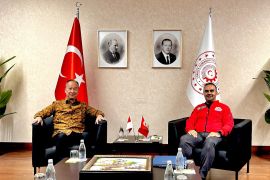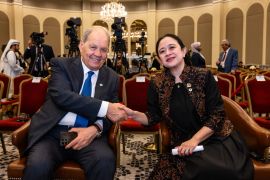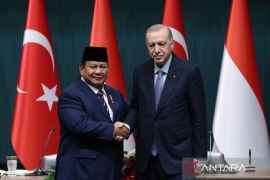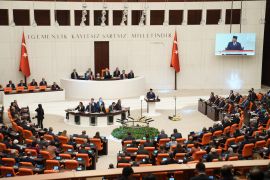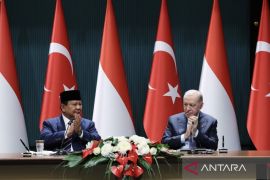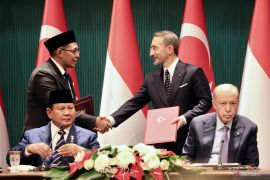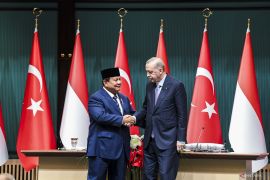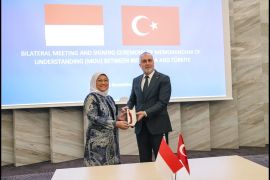"The Sacrifice Festival is about charity. People are constantly on the move visiting family and friends.."Kocaeli, Turkey (ANTARA News) Tradition of "Mudik" or going back to the hometown does not only happen in Indonesia, but also in Turkey.
That is how i experienced during the Kurban Bayram holidays here.
Kurban Bayram or the Feast of Sacrifice is celebrated by Muslims in Turkey, or known more as Eid al-Adha. The festival, which this year falls on the 15th to the 18th of October, commemorates an event when Islamic prophet Ibrahim sacrificed a ram, in place of his son Ismael, as an act of obedience to God.
As it is a public holiday, many Turkish people travel to visit family members and friends.
I was invited to stay at Osman Gedikli`s house, a Turk and a father of my close friend, during the whole Bayram holiday in 'zmit, Kocaeli. On that time i didn't have a plan for the annual 4-day holiday.
The student dormitory that i stayed in Ankara would also be closed during the Bayram holidays, so i decided to accept the invitation and went to Kocaeli.
I thought i would only be staying at the house and do nothing special for the Kurban Bayram, considering how secular Turkey is. But on the D-1 to the Bayram day, Osman Gedikli said that we were going to Duzce, the province where their grandparents live. So then i packed my bag and went with them.
On the way to Duzce, seeing the pleasant view of a natural village where the crops grow and cattles live free, i then remembered my family`s tradition to visit our grandmother`s house in Rangkasbitung, Banten.
We visit our relatives, ask for forgiveness, and eat special Eid food. In Indonesia we usually eat ketupat (rice cake coated with coconut leaf) served with opor ayam (chicken cooked in coconut milk) or rendang (spicy meat).
Like in Indonesia during "Lebaran", Turkish people also visit families in their hometown. It was very crowded in the bus terminal where i departed Ankara. It reminded me of the "mudik" season in Indonesia where everybody goes back to their hometown and bus tickets were sold out.
The typical thing for the Feast of the Sacrifice is that parents buy new outfits for their children and give the old clothes to the poor. The children wear their new clothes throughout the festival just like "Lebaran" in Indonesia.
Many shops, banks and businesses are closed for the duration of the festival. Supermarkets usually remain open but on restricted hours. Travel is also hectic at this time, as people visit friends and relatives to celebrate.
In Duzce, we meet with the grandparents. The children kiss the hands of the elders and put them on their foreheads, showing respect. After, the elders give money, a special Bayram "hediye" for the children, same as Indonesia's THR or Chinese's angpao tradition.
Even i got hediye 50 Turkish lira (around Rp300.000) from the grandmother and 20 lira more from the grandfather. Lucky me since i am a student and not a kid anymore, but they still give me a THR.
"The Sacrifice Festival is about charity. People are constantly on the move visiting family and friends. Family ties get strengthened and children are given an opportunity to bond with the older generations," said Yusuf Gedikli, the grandfather.
The men only
A big Kurban difference between that in Turkey and Indonesia is about the Eid prayer. In Indonesia, everyone goes to the mosque on the Eid day before the Kurban sacrifice starts, regardless of their gender or age. While in Turkey, the men are the only ones who do the prayers, while the women go back home for preparing the meal.
When the men return home, we all eat together with the meal prepared by the women before. After that, the Kurban sacrifice starts. This family sacrificed their cows which were under the name for seven people, including their aunt, uncle, and neighbors.
In Islam, sacrificing a cow can represent seven people, while one goat or sheep can only represent one person.
While the Turkish government has recently made it illegal to sacrifice the animals in public places such as playgrounds and parks - advocating professional abattoirs instead - this is not always enforced.
The Gediklis slaughtered a cow in the backyard. They then cut up the animal in full view for the ritual sharing of the meat to the needy people. Some pieces of the meat were also cooked at home.
We only spent one night in Duzce, regarding the fact that there were still some relatives back in Kocaeli. After returning from Duzce, we visited the other relatives` houses.
In Turkey, it is very common to serve sweets in Bayram, such as chocolate, candy, and cakes. There is a traditional Turkish dessert called Baklava, usually made special for Bayram.
It is a sweet pastry with nuts inside and coated with melted sugar. Every time I visit a relative`s house, �ay (Turkish tea) and baklava are served.
It was a very happy time during Bayram, where all of the families meet each other, share stories, and eat good food. I had a great time experiencing this new culture, but i also miss my family tradition and our special Eid food back home.
(Nadira Puteri Kusaeni is a student of international relations at Bilkent University, Ankara)
Reporter: Nadira Puteri Kusaeni
Editor: Risbiani Fardaniah
Copyright © ANTARA 2013

